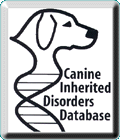
German shepherd pyoderma
Bacterial skin infection (pyoderma) is very common in dogs, and is usually easily treated with antibiotics. Infection is almost invariably caused by Staphylococcus intermedius, which does not produce any problems in people.
Chronic, recurring, or deep infections can also occur, generally due to an underlying cause, and these are more difficult to treat. In German shepherds, a deep pyoderma is seen (meaning the infection extends beyond and beneath superficial structures in the skin) which causes severe chronic draining lesions in the area of the lower back and hind legs. Sometimes an underlying cause can be identified.
The predisposition to this condition is thought to be autosomal recessive; however as with all pyodermas, there are frequently other factors involved.
The condition most often develops in middle-aged, otherwise healthy dogs. You may first notice that your dog bites at the lower back region, indicating itchiness. Early lesions such as pustules, erosions and crusting may be hidden by the haircoat but gradually there will be hair loss, deeper ulcerations and draining sinuses. The areas affected (lower back, outer thighs) may be quite painful.
The condition is diagnosed based on the clinical signs, response to antibiotics, and recurring nature.
Predisposing factors such as fleas, flea-bite hypersensitivity, food allergies, and hypothyroidism must be identified and treated. Appropriate antibiotics must be given for a sufficient length of time, which may be as long as 6 to 10 weeks. Your veterinarian will likely also recommend antibacterial shampoos to remove infectious debris (discharge, crusts, etc).
This recurrent condition usually requires life-long management. Your veterinarian will work with you to devise a control programme that works for your dog, which may include immunomodulatory bacterins, long term antibiotic use, and/or regular antibacterial shampoos.
Avoid breeding affected dogs and their close relatives.
FOR MORE INFORMATION ABOUT THIS DISORDER, PLEASE SEE YOUR VETERINARIAN.
DeBoer, D.J. 1995. Management of chronic and recurrent pyoderma in the dog. In J.D. Bonagura and R.W. Kirk (eds.) Kirk's Current Veterinary Therapy XII Small Animal Practice. p. 611-617. W.B. Saunders Co., Toronto.
- Disorder Type:

